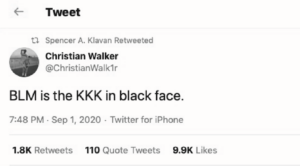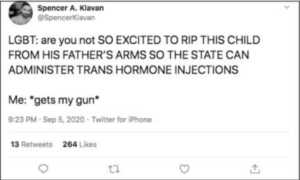by The Cowl Editor on September 17, 2020
Campus


Humanities Forum Offensive to Many
Speaker’s Hateful Social Media Draws Campus-Wide Attention
by Savannah Plaisted ’21
Opinion Co-Editor
Over the past several months, Providence College administrators and representatives released multiple statements that claimed they were committed to combating racism and improving diversity on our campus. However, inviting academics like Spencer Klavan to speak on this campus contradicts the commitments that the College made, and serves as evidence that PC is not seriously committed to acting on these promises.
Klavan was invited to speak on the Iliad at last Friday’s Humanities Forum. While the topic of Klavan’s presentation on campus was not controversial, his personal Twitter account was discovered to be riddled with inflammatory rhetoric on topics of race, gender, and sexual orientation. He also expressed his position on wearing masks, through publicly encouraging people to not wear them.
One of Klavan’s retweets was “BLM is the KKK in black face,” and one of his personal tweets was “Anyway, there are two genders, you’re probably not racist, and America is excellent.”
Given that we are currently experiencing one of the biggest national civil rights movements in history, and the fact that the College had been called out for the use of racist language in a safety advisory released by the Office of Public Safety the day before, it could not have been a worse time to host someone with views like Klavan’s on campus.
As word spread on Friday about Klavan’s Twitter, a number of students began emailing the Humanities Forum Committee members, calling for the cancellation of the Humanities Forum scheduled for later that afternoon. Additionally, a number of professors and departments expressed their discomfort in allowing the Forum to continue as planned.
Dr. Abigail Brooks, the director of the women’s and gender studies program, said in a statement alongside Dr. Zophia Edwards, director of the black studies department, “The WGS and BLS Programs strongly condemn this decision.” Dr. Erin Schmidt of the theatre, dance, and film department, and a Humanities Forum Committee member, wrote, “I think it is important that I state, for the record, that I, too, would like to see the Forum cancelled with Mr. Klavan.”
Despite this, the Forum went on as planned on Friday at 3 p.m. Student activism, condemnation from three members of the Humanities Forum Committee (including Dr. Schmidt), and calls to cancel the event from multiple professors were not enough.
Dr. Hain indicated that the Humanities Forum Committee does not vote on speakers; rather, he himself has the final say on the selection process. “The Humanities Forum Committee works collaboratively,” he said, “but [it] does not vote on each semester’s schedule or on particular events.”
What, then, is the purpose of having a committee full of professors? If these events are put on for the advancement of student knowledge, should students not have a say in picking speakers? Dr. Hain stated, “Now that the Forum is part of the Humanities Program, I hope eventually to include one or more students in the Program in the work of the Forum committee.” This, however, is part of a long-term plan, so there is no indication of when students might be included.
Sean Reid, the Provost, issued a statement just minutes before the end of the Forum, explaining that the problematic nature of Klavan’s Twitter had been brought to the College’s attention on Wednesday, Sept. 9. Yet, despite the fact that this discovery was made far enough in advance to have cancelled the Forum, the College made the determination that Klavan’s rhetoric was not hateful enough to cancel the event, and concluded that a cancellation would “set a bad precedent for the expression of diverse viewpoints and for the possibility of open debate.”
Is it not more important to vet such individuals before inviting them to campus to ensure that their public statements are in line with the values of the College and not offensive to members of the Providence College community? Dr. Hain wrote in his explanation to the Humanities Forum Committee, “I believe the best response is to include a broad range of views rather than to exclude individuals who do not agree with one or more political perspectives.”
However, racism, homophobia, and sexism must not be considered political perspectives; they are human rights issues. While some of Klavan’s rhetoric on Twitter does express his political affiliation, the issue at hand is the blatantly hateful statements made in several tweets. Statements to which several members of the PC community took offense.
Dr. Hain explained later that in order to vet the candidates for Forums “we look into their professional experience and published work.” Klavan’s tweets were therefore overlooked completely. Inviting a speaker to campus involves endorsing the whole person—racist, sexist, transphobic, and homophobic tweets included. The very fact that he was invited to speak only on the Iliad is no excuse for giving him a platform.
It is also notable that Dr. Hain responded to the allegation of homophobia on the part of Dr. Klavan with: “Dr. Klavan himself is married to a man, and therefore the accusation of homophobia should at the least be more nuanced than it appears in the messages critical of his visit.”
Interalized homophobia is defined as “the type of homophobia occurring in a homosexual person, often associated with self-loathing, self-censure, and self-censorship,” (Medical Dictionary). In other words, individual members of the LGBTQ+ community can be homophobic, in the same way that a female can be sexist. Being part of a community does not exempt one from being discriminatory against said community or its members. Dr. Hain’s comment in no way excuses the obvious homophobia displayed in Klavan’s tweets.
Dr. Hain addressed student concerns about the Forum, saying, “We have three events scheduled this fall that, I hope, those critical of today’s guest will be glad to see on our schedule: a two week series devoted to the consideration of John Lewis, and a conversation with Thomas Chatterton Williams in November.” It is also absolutely no consolation that the future forums were cited. These planned events will not make up for the racism expressed by Spencer Klavan in his tweets and endorsed by the College via his invitation to speak.
Kaila Jean-Charles ’22 stated on the matter, “I honestly feel like Dr. Hain missed the point of students trying to get it cancelled. I believe the response was inadequate and invalidated the opinions of the majority. It rested too much on assumptions and honestly felt like a slap in the face.”
As a form of protest against this event, students and professors alike intended to change their profile pictures on Zoom to either screenshots of Klavan’s tweets or a Black Lives Matter fist with a rainbow. While the Q&A function remained on, the only people who were able to see the questions asked were the hosts. Thus, no public statements could be made by students or staff.
Dr. Hain reported that this format was put into place in August when decisions for the Forums were being finalized. Yet, earlier in the week, a teach-in event that was open to the entire student body and staff, was not censored and allowed for all participants to share their voices. Dr. Hain stated, “The Zoom webinar format allows for a couple different ways to take audience questions, and we decided to experiment with written questions since this was our first Forum Zoom event.”
Censorship is extremely harmful to the practice of “respectful discussion and the representation of a diverse range of viewpoints,” which is what Dr. Hain claimed is always the goal of the Humanities Forum Committee. All future Humanities Forums must be completely open Zoom lectures in order to properly hear all viewpoints and engage in discussion.
The lack of proper vetting on the part of the Humanities Forum Committee, the censorship of the event itself, and the unfounded and ill-informed “justifications” for allowing the event to continue as scheduled all serve to put PC, yet again, at odds with its student body, specifically members of the BIPOC and LGBTQ+ communities. It comes as no surprise that students are left leading the charge towards legitimate change on campus.
Students are exhausted from bearing the burden of the College’s inaction, but they nonetheless are willing to take on leadership responsibilities in the Humanities Forum Committee and similar College institutions. Such student involvement is much-needed and well-deserved. Crumbs are not the same as a place at the table.